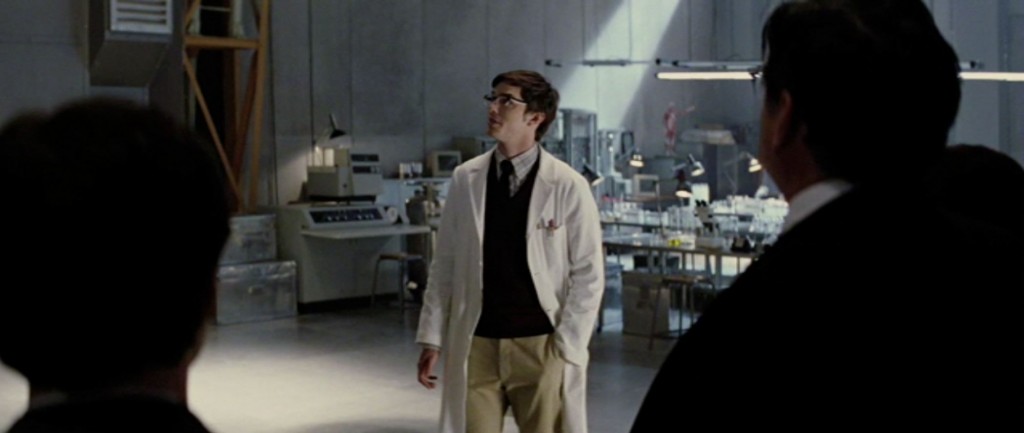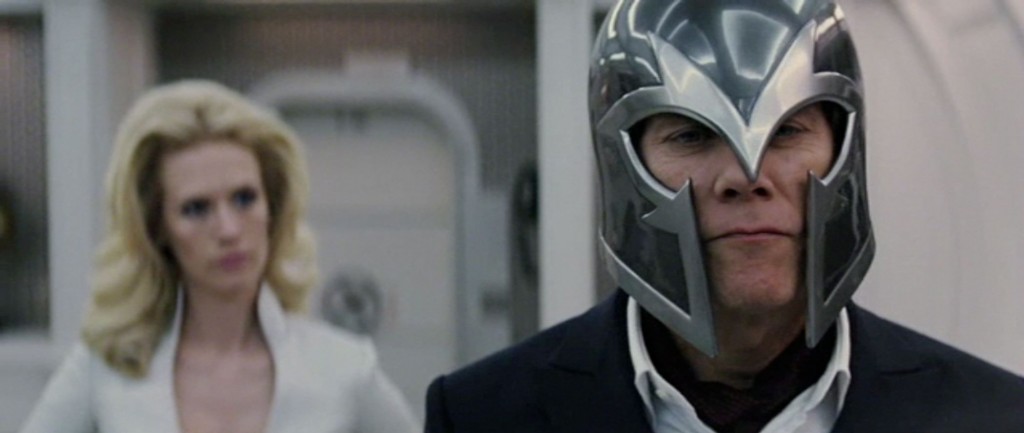X-Men: First Class part 5
Erik, tracking the man he knows as Dr. Schmidt to Miami, surfaces, James-Bond-in-Goldfinger style, in the harbor near Schmidt’s yacht, the one with the boat’s name in Trajan. He climbs aboard the yacht and finds Schmidt (who of course is actually Sebastian Shaw), lounging with Emma Frost and Riptide. Erik has brought a knife, the Nazi dagger he got from the “pig farmer” in Argentina. He is, of course, thinking of the right tool for the job of killing Schmidt — a Nazi dagger reading “Blood and Honor” on the blade, he feels, should carry the right moral heft. He’s wrong in this, and it will take him until the end of the movie to figure out the right tool to use to kill Schmidt.
To Erik, it looks like Schmidt is a callow jet-setter with a bimbo and a manservant, or perhaps a bisexual playboy, but surprise! all three are mutants. Erik gets the full brunt of Emma’s powers — the mind-reading (“He’s here to kill you” she divines, using only her psychic powers, and maybe the fact that Erik has snuck aboard in a black wetsuit and is brandishing a dagger), the diamond-skin, a sonic blast that incapacitates him and, apparently, some telekinetic powers — rather a lot of abilities for one mutant — that blast him overboard. Shaw adds a moral wrinkle to the scene, chastises Emma: “We don’t harm our own kind,” he says, perhaps forgetting about that time he killed Erik’s mother.
Coincidentally, the Coast Guard shows up.
Coincidentally, that is, in one sense, but not in another. Coincidence in that the Coast Guard just happens to catch up with Shaw at the exact moment that Erik does, but not coincidence because it is Xavier on the Coast Guard ship, in charge of the raid, which makes the scene the culmination of the act, bringing together our two leads in an epic “meet cute” for our love story to flourish. That’s what the whole arc of this first thirty-five minutes of the movie has been, just showing the paths our two protagonists take to meet each other. We met Erik in the prision camp contrasted with Xavier in his estate, then Erik hunting Nazis while Xavier picks off coeds, now we have Erik trying to get Shaw with a wetsuit and a knife, while Xavier has at his disposal the US Coast Guard.
Neither, we see, is a match for Shaw, who can block Xavier’s mind-reading powers with Emma’s own telepathy (somehow) and block the Coast Guard raiders with Riptide’s tornado-making powers, and escape in a submarine with the awesome power of A Lot of Money. (Erik tries a second tool on Shaw, his ship’s anchor chain, which also proves ineffective.) Erik tries to stop the getaway sub with his metal-controlling powers, but he’s not strong enough yet and Xavier must jump into the water to save him from drowning. “I thought I was alone,” says Erik, and Xavier informs him “You’re not alone.” In its own way, it’s as romantic as “I wish I could quit you” or “You had me at hello.”
Act II begins and we move to The Man in the Black Suit’s Secret CIA Outpost, where apparently he has carte blanche to do anything he wants, including working with paranormal phenomena. The MiB says he’s developing these studies for purposes of military defense, to which Erik quickly adds “Or offense,” which is both a dig at the hypocrisy of the CIA (as though any weapon would be developed purely for defense) and a glimpse into the future schism between him and Xavier.
We now meet Hank McCoy, who is a researcher working for the MiB. He’s built a spyplane for the CIA, a reference to the U2, not the Irish band but the airplane, which, in 1960, was shot down over the Soviet Union, another key incident in the Cold War. Xavier “outs” Hank as a mutant, something the MiB didn’t even know. Hank is embarrassed — he’s been trying to keep his mutation a secret. “You didn’t ask, so I didn’t tell,” he mumbles, another rare anachronism in this movie as he jumps thirty years in political references. The notion that Hank would be a mutant working for the CIA is, of course, a reference to the whole anti-communist fervor of the times, presented here as suspicion of homosexuality. In 1962, the only people who could be trusted, it was widely believed, was straight white men — anyone else might be a communist, or at least easily compromised and therefore suspicious as a communist dupe. In Dr. Strangelove, Col Guano both equates and confuses communists and “preverts,” to a certain mindset of the time they were one and the same. There were, of course, many, many closeted gays working for spy organizations in the post-war era — who is better at keeping secrets, after all? — but to live openly would be to court death. (Ignoring, of course, that the director of the FBI, and who knows how many other highly-placed intelligence officials, were gay, this being a key approach of J. Edgar Hoover: make everyone so terrified of being discovered of being gay that they will never, ever ask if you are.)
So Hank, like Raven, has a mutation that makes him a monster, so he’s been hiding it all his life. “If people knew, they’d hate me” is the reasoning here. Erik compares himself to Frankenstein’s monster in an earlier scene, and clearly that creature’s fate is what Hank and Raven expect to happen to them — villagers with pitchforks and a burning windmill. Hank, one could extrapolate, became brilliant and graduated from MIT at 15 so that people might not notice that he also has a mutation: hands as feet. But now, Hank sees that he’s among friends, specifically Raven, who, for the first time, sees a boy she likes who might like her back. Which is both romantic and a little sad, since, theoretically anyway, both Raven and Hank deserve to be loved by “normal” people, they shouldn’t need to date “within their race” if they don’t want to. In any case, since First Class can’t really go so far as to create a physical love story between Xavier and Erik, it instead offers one between Raven and Hank.
Oddly enough, the scene offers up another anachronism, this one cinematic: Raven goes to the upside-down Hank and looks ready to kiss him in a visual quote from 2002’s Spider-Man, the movie that launched the “Marvel Movie” brand in the first place. “You’re amazing,” gushes Raven, in case we didn’t get the reference.
Meanwhile, in Sebastian Shaw’s swanky, swingin’, Bond-villain-style submarine, Shaw and Emma watch a news report on the American missiles in Turkey. The placement of missiles in the Cold War was a real thing, for those too young to know, and was largely where the battles of the Cold War were fought. The world was the chessboard of the superpowers in the early 1960s, and the thing that was keeping us all alive was a doctrine called MAD, which stood for “Mutually Assured Destruction.” That is, the only thing that kept us from destroying another country’s cities was the assurance that our cities, too, would be destroyed. It created all the tension of war, and the economic boom of war, without having to deal with battlefields or bloodshed. The battles were fought in people’s minds, which makes the early 1960s the perfect place for someone like Xavier to fight — who better to manipulate the minds of the populace?
Shaw, of course, understands this, and he has had “the Russians” (the KGB?) design for him a spiffy helmet that, somehow, will block a telepath’s attempts to read his mind. Ordinarily, this would make Shaw a genuine tinfoil-hat conspiracy nut, but in this case the helmet serves its purpose. To compensate for the helmet looking kind of ridiculous, he acts like a jerk to Emma, suddenly becoming Don Draper to her Betsy, telling her to fetch some ice for his drink. Even at the frontiers of human experience, it seems, the old biases still thrive.





“We don’t harm our own kind,” he says, perhaps forgetting about that time he killed Erik’s mother.
Ah, but was she a mutant? I don’t think so. She was just dead wood to be pruned away. (Though clearly Shaw backs off that whole “no physical harm” thing by the end of the film, what with all the fighting his minions do.)
In any case, since First Class can’t really go so far as to create a physical love story between Xavier and Erik
As usual, they’ve left that to the fanfic writers. Which is HUGELY DISTRACTING to me, since my father’s name is Charles and my brother’s name is Erik . . . yeah, I scroll very quickly past anybody on my flist who happens to post XMFC fic, regardless of the content rating.
(I note, though, that you’ve fallen into a pattern of calling Charles “Xavier,” but not calling Erik “Lensherr.”)
I’m thinking of “harm” in the sense that most would see harm in murdering someone’s mother.
I’m calling Charles “Xavier” and Erik Erik because I couldn’t remember that Xavier’s name is Charles, and then I wanted to be consistent. I figured if I couldn’t rememeber Xavier’s name being Charles, it’s better to go with Xavier, the name more people know him by. I don’t call Erik “Lehnsherr” because nobody calls him that, it’s either Erik or Magneto. The comics don’t even always call him Lehnsherr.
True — he actually has three last names in various canons (Lensherr, Lehnsherr, and apparently Eisenhardt). Anyway, I’m just as happy to have Xavier be called by that name; it’s less distracting for me.
As for the “harm,” well, yes — most would see harm in murdering someone’s mother. I’m just not sure Schmidt/Shaw would agree, not when that mother is an ordinary human. Or at least, he wouldn’t consider it something to be concerned about.
He was known as “Magnus” for forever in the comics. (His middle name apparently.)
You’ve got the wrong Hoover. Herbert Hoover was President between Coolidge and FDR; J. Edgar Hoover was the closeted FBI director.
There’s a comic book from the 50s that I’d love to own – an issue of “Calling All Boys” with a photo of J. Edgar on the cover.
there’s some other cultural masking — “xavier” would be pronounced as “javier” is, traditionally. i don’t know where pronouncing the “x” as in the name of the letter rather than the sound it makes (“x-saviour”?) started, but i’d guess its root is in masking spanish decent, which at least gives charles a familial lineage of assimilation, considering the treatment of spaniards (especially those of obvious moorish descent) up through the last century.
also! on shaw’s chastising of frost, it strikes me as a parallel to the cia’s (“the new nazis”) treatment of women as secondary — he would’ve handled eric himself, but was protected by a woman and needed to save face. at several points in the movie, he shows a complete willingness to harm his own kind.
It has never occurred to me that Charles is anything but English. That’s really interesting.